Sermon Notes & Videos
2024-12-06 | II-Peter-1:2-11 | The Infinite Imperishable Jackpot
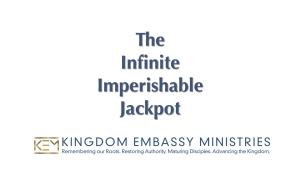 What’s are your highest aspirations? For what are you working so hard to achieve? What are your ultimate goals? What final destination will bring you the greatest satisfaction? What are you running toward with such fervency? On what are you most passionately focused? If you were asked to describe your heart’s desires, what would be your most cherished prize? Seven excellent questions, but for most people unfortunately, as the train pulls into their dream station, they discover something utterly disturbing about their destination. It was all a mirage, a total illusion. Tragically, everything they believed would bring them a feeling of completion and a sense of meaningful accomplishment was an utter delusion— a thorough deception!
What’s are your highest aspirations? For what are you working so hard to achieve? What are your ultimate goals? What final destination will bring you the greatest satisfaction? What are you running toward with such fervency? On what are you most passionately focused? If you were asked to describe your heart’s desires, what would be your most cherished prize? Seven excellent questions, but for most people unfortunately, as the train pulls into their dream station, they discover something utterly disturbing about their destination. It was all a mirage, a total illusion. Tragically, everything they believed would bring them a feeling of completion and a sense of meaningful accomplishment was an utter delusion— a thorough deception!
God’s word has much to say on this topic. If you understood His perspective and applied His knowledge beforehand, that kind of wisdom would help you avoid the guaranteed regret, misfotrune, and frustration that is assured anyone who chases rotting carcasses and evaporating vapors. But, God’s precious and exceedingly great promises will never disappoint you; they are infinite and imperishable, while all other treasures that you might chase, even if attained, will be dreadfully temporary.
It’s an epidemic of human achievement, but not because there is anything inherently wrong with human advancements and accomplishments. It’s just that the intense desires for such success transform from God honoring stewardship to a disease of human achievement in a particular environment. At this moment, you should be begging to recognize that type of environment. It’s a pathological setting that can be easily diagnosed with one test question, as long as you are willing to be honest with yourself: “What satisfies your soul?” When your self-talk sounds like this… “Soul, you have many goods laid up for many years; you are a true success,” the disease process has set in. The Great Physician has life-saving advice for this patient… “You foolish one, tonight is your last and your soul is being recalled. The things which you worked so hard to accumulate—whose will they be when you are gone? Since you can’t keep what you’ve accumulated after death—your wealth, achievements, and accomplishments, don’t bother laying up those perishable treasures for yourselves on earth. Instead, lay up for yourselves treasures in heaven that are permanent.”
Here is the true measure of your success—godly stewardship of your advancements and accomplishments. “Delight yourself in Yahweh, and He will give you the desires of your heart.” If you accumulate treasures for yourself here on earth, but you are not rich towards God, those treasures actually expose the disease of your heart. For you, there will only ever be a temporary and corruptible crown. But, if your heart is one that chases the riches of God, His precious and exceedingly great promises, your rewards will be infinite and incorruptible.
2024-11-22 | II Peter 1:1-2 | Faith Like Mine
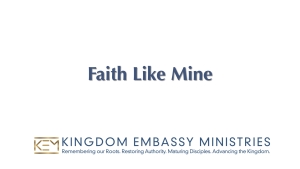 In the Good News of Christ God’s righteousness is revealed from faith to faith. Why two faiths and not one? Surely faith should be unified into a single concept; God’s righteousness is revealed in faith. But, that would be like saying a man who receives a great inheritance from his father would be considered a good steward of that inheritance regardless of what he does with it. The man who guards it and does nothing; and the man who squanders it with wasteful spending; and the man who makes wise investments or uses it to grow into new successful enterprises, should all be considered equally as faithful. But that isn’t reality; to be truly faithful a man must go from faith to faith—from the free gift of faith to the practice of faith!
In the Good News of Christ God’s righteousness is revealed from faith to faith. Why two faiths and not one? Surely faith should be unified into a single concept; God’s righteousness is revealed in faith. But, that would be like saying a man who receives a great inheritance from his father would be considered a good steward of that inheritance regardless of what he does with it. The man who guards it and does nothing; and the man who squanders it with wasteful spending; and the man who makes wise investments or uses it to grow into new successful enterprises, should all be considered equally as faithful. But that isn’t reality; to be truly faithful a man must go from faith to faith—from the free gift of faith to the practice of faith!
Jesus sat at the Last Supper table and delivered to His disciples His most prophetic mandate—this is what is coming and this is who you will be. And He made it clear that He was extending that mandate to a world beyond that table. His petition just hours before His execution: “Father, I pray that My disciples grasp this profound revelation and calling, and to embrace that it doesn’t end with them. It is for every disciple who will ever come to faith in Me, because I now commission them to preach this message—as You sent Me into the world, I now send them into the world. My ultimate desire is that this truth would perfectly unify God’s people, as if they are one person, as We are indeed One Person.”
Peter sat at that table and heard His Savior’s heart. Many years later he knew, just prior to his own execution, that he too must leave a legacy. He would write to his disciples and by extension his words were meant to touch us all; “This letter is to those who have obtained a like precious faith. It is first addressed to all those who have received the gift of faith. But ultimately it’s for those who wish to obtain a second type of faith like mine—to walk the narrow road from faith to faith. It’s a faith I obtained for free that is on a journey of faith that I was obedient to practice. The instructions in this letter will explain how.” Yes, two faiths—and dead is the former without
the latter.
2024-11-08 | II Peter | A Last Will & Testament
 When you look around at the state of the Church, what impression do you get? How is the Body of Christ developing? These are difficult questions, so a bit more detail might help clarify. Add maturity as one of the search filters and remove size. Now contemplate your answers again. The Church has certainly become larger and with the advent of the seeker-friendly mega-church, the numbers are impressive. What is the state of the mega-church brand of Christianity, if we are not counting numbers? Don’t count attendance; don’t count weekly services; don’t count tithes; don’t count conversions; and don’t count staff members, etc. Do, instead, identify disciples.
When you look around at the state of the Church, what impression do you get? How is the Body of Christ developing? These are difficult questions, so a bit more detail might help clarify. Add maturity as one of the search filters and remove size. Now contemplate your answers again. The Church has certainly become larger and with the advent of the seeker-friendly mega-church, the numbers are impressive. What is the state of the mega-church brand of Christianity, if we are not counting numbers? Don’t count attendance; don’t count weekly services; don’t count tithes; don’t count conversions; and don’t count staff members, etc. Do, instead, identify disciples.
An invitation into the family of God is waiting for everyone; all it takes is a heart touched by God’s grace and then a gentle explanation of how to become a Christian. The entrance cost is free; Jesus Christ paid it all. Yet, if you add maturity as a filter and becoming a disciple as the goal, you won’t find too many takers. Maybe even worse, you won’t find too many offers. That is because becoming a disciple is anything but free; it could cost you everything—even your life! Plus, it takes church leadership less concerned about size and more concerned about depth.
The modern congregation is a mile wide and an inch deep. The raw numbers are impressive, and yet the percentage of biblically literate disciples is anemic. That is because discipleship takes a training regimen that cannot be approached casually. What we discover in Peter’s letter is a step-by-step program for growth—from salvation to the ultimate maturity. Peter organizes his plan just as you’d expect from a man who fished for a living. It’s simple, systematic, predictable, measurable, effective, consistent, and duplicatable. It won’t take a genius to learn, nor teach. The Apostle Paul, a true scholar, must have learned a lesson or two about simplicity from this blue-collar worker before he wrote, “Commit the things you’ve heard from me, from many witnesses, to faithful men who are able to teach others also.” He must have heard what Peter thought of his usual approach, “In all of his letters Paul speaks of the same things of which I write. But, his way of communication makes it more difficult to understand. Ignorant and unstable men then twist and distort his words, as they do the Scriptures. That is always very damaging to themselves and to those who trust them.”
2024-11-01 | Romans 1:18-32 | In His Image We Vote
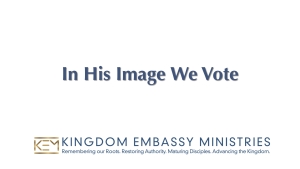 How exactly did God reveal Himself to mankind? He manifested inside of us! At creation, He did something so all of mankind would recognize Him as the only God; He created man in His own image. And He did so in such a way that no person, at any time in history, no matter their culture, creed, religion, place of origin, heritage, or nationality, could be excused of their ignorance.
How exactly did God reveal Himself to mankind? He manifested inside of us! At creation, He did something so all of mankind would recognize Him as the only God; He created man in His own image. And He did so in such a way that no person, at any time in history, no matter their culture, creed, religion, place of origin, heritage, or nationality, could be excused of their ignorance.
What is the cost to a man who refuses to recognize Him? Eventually, God turns him over to depraved thoughts. The price of his foolishness is that the natural light in his heart grows dim, until it is completely dark. From there he will be apt to worship just about anything: man, animals, insects, and even inanimate objects! After that he will become obsessed with lust, especially sexual lust. This will then cascade into every type of sexual perversion; gender confusion often becoming first among them. Then, gender confusion and sexual sin open the gateway to every type of iniquity.
“In His Image We Vote” addresses what every Christian should know before they cast their vote. The existential crisis of our day is rooted in lies about: gender and sexual orientation; the sanctity of marriage; and the right to life. Again, at creation God made His invisible attributes visible for all mankind, so that no man would have an excuse to deny His existence. It should be obvious by simply observing the natural world, and yet there was something even more profound than the testimony of nature.
This is the secret to the deeper meaning of God’s invisible attributes; God is three in one and He created man in His image as three in one. What was originally hidden in Adam at creation was the woman and child. All you could recognize with your eyes in the Garden was the man, and yet God identified him as ‘them’ and told him to multiply. To see what was hidden within, first God extracted Eve from Adam and showed the woman to him. Now, she was no longer invisible. Then, God created marriage between the man and the woman to assure them that they were never meant to be apart; they were one as God was one. What began as what appeared to be a man standing alone in the Garden, instructed to be fruitful and multiply, culminated as the couple, reunited as one in marriage, made the final piece visible; “With the Lord’s help, I have given birth to a son,” the living manifestation of two becoming one! God’s invisible attributes were manifest in us and revealed to us: First the hidden woman was brought to the man, and now the hidden son is no longer concealed.
As you can see, within Adam at creation was the human family, the image of the invisible God. That is what it means that God “manifest in them and showed it to them.” Men would eventually suppress this truth and come against God by attacking the family—thus denying God’s revealed identity. They would contradict that there are only two genders; reject the sanctity of marriage; or define abortion as, ‘reproductive rights that need protection’, and even deny that using abortion as birth-control is murder. Isn’t this precisely what we are witnessing today? It all stems from the denial of God’s image, which opens the gateway of sexual immorality and then leads to all the atrocious sins that follow.
When it comes to political choices, how could any Christian vote for a candidate who denies anything that God used to reveal His image? I pray this teaching would become a staple to help inform all Christians how to vote without compromising their faith—to vote in Bible, or “In His Image We Vote.”
2024-10-25 | Leviticus 23:36-39 | Wedding Day | The Marriage Supper of the Lamb
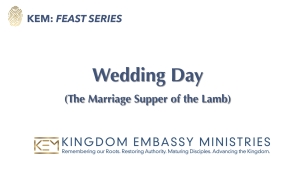 It was a betrothal and today we have all but lost the dense significance of such customs. Once the image was diluted it did not take long before the tradition was replaced by something much less meaningful. Marriage today is most often preceded by engagement, an offer of marriage and loose promise between two people, if accepted, to get married one day. And why would that event be anything significant when all the benefits of marriage are readily available outside of marriage and shared already—including sexual intimacy and cohabitation. Gone are the binding commitments and isn’t that most obvious by how often marriages end, as if they are disposable inconveniences that have run their useful course. Why own when you can rent? Why buy when you can use someone else’s property, for a while, and just walk away when something breaks or upkeep becomes too much work?
It was a betrothal and today we have all but lost the dense significance of such customs. Once the image was diluted it did not take long before the tradition was replaced by something much less meaningful. Marriage today is most often preceded by engagement, an offer of marriage and loose promise between two people, if accepted, to get married one day. And why would that event be anything significant when all the benefits of marriage are readily available outside of marriage and shared already—including sexual intimacy and cohabitation. Gone are the binding commitments and isn’t that most obvious by how often marriages end, as if they are disposable inconveniences that have run their useful course. Why own when you can rent? Why buy when you can use someone else’s property, for a while, and just walk away when something breaks or upkeep becomes too much work?
Betrothal is different, but in order to even begin to grasp why, you must learn to see marriage differently. Marriage was the one institution, the only institution, designed by God to indicate mankind was created in His image. Adam was created and even before Eve was pulled from his bones, Adam already had within him everything that represented God—man, woman, and child. But we could not see the woman and child, so God extracted the woman and presented her to Adam, really to all of us. That is when we recognized the family that was inside of him all along—God’s image. And then came marriage. God instructed, “Let Me assure you that even though I took her from you, she is still one with you.” Marriage is simply, but profoundly, God’s way of telling us, we are one with Him, created in His image, forevermore.
When you consider this idea, does it not make so much more sense now when we read in the Scriptures that marriage is about Christ’s oneness with His bride, the church? Yes, His bride but yet to have arrived at the altar of marriage. His bride, but presently His betrothed, bound in a covenant as strong as marriage, but quite not married. All the permanence minus two things, sexual intimacy and cohabitation. Think back when Joseph thought that Mary had been unfaithful, having been found with child. Did he not consider divorce, even though they were yet only betrothed? That is the binding nature of betrothal. Do you see how much more powerful this is than the idea of engagement? And do you see how harmful it is to engage in the things reserved ONLY for marriage, OUTSIDE of marriage? It cheapens marriage, weakens it. It has diluted the meaning of marriage so badly that we’ve arrived at a cultural crossroads; marriage is unnecessary. Marriage is an outdated institution, and by extension, so is the family. In other words, seeing the human family as the expressed image of God has become obsolete; it’s a relic best designated to the museum reserved for all things archaic.
And all of this is to bring us to this one point. The Eighth Day of the Feast of Tabernacles, the Last Great Day, has been the rehearsal dinner for the marriage supper of the Lamb for thousands of years. The bride, that’s you, must make herself ready by putting on her pure white wedding garment because the wedding day is approaching and the Groom is on His way—don’t be found without your garment! It will be a holy convocation, a sacred assembly. It’s a day designated “The Joy of the Law.” Maybe that’s because when the Groom arrives and after He takes care of some much needed business, we will be legally transitioned from His betrothed to His wife. Could there be anything more joyful than that?
2024-10-18 | Leviticus 23:33-44 | It’s Temporary | Tabernacles 2024
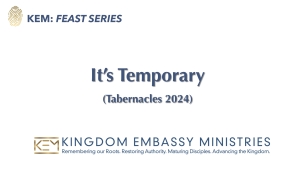 The Word became flesh and pitched a tent among us. He tabernacled with us and we beheld His glory. Yet He was here for what seemed like just a vapor of time and that is because He was never meant to stay. “I am in this world but not of this world,” He would say. Y’shua’s life bears the striking symbolism of God’s people after their exodus from Egypt, as they ventured into freedom and tabernacled in the wilderness. Pitch a tent, but be sure it’s built as a temporary structure because you won’t be staying very long. This is not your land; you are just sojourners passing through and your permanent home is elsewhere.
The Word became flesh and pitched a tent among us. He tabernacled with us and we beheld His glory. Yet He was here for what seemed like just a vapor of time and that is because He was never meant to stay. “I am in this world but not of this world,” He would say. Y’shua’s life bears the striking symbolism of God’s people after their exodus from Egypt, as they ventured into freedom and tabernacled in the wilderness. Pitch a tent, but be sure it’s built as a temporary structure because you won’t be staying very long. This is not your land; you are just sojourners passing through and your permanent home is elsewhere.
It was true for the Israelites in the wilderness; it was true for Y’shua when He was born into this world; and it is true even for you. This is not your permanent home and the body in which you live is not your permanent body. In this world you will have trials, but He has overcome this world. In your permanent body and in your permanent home there will be no more trials, no more tears, no more pain. There will be only righteousness, peace and joy.
The imagery in the Feast of Tabernacles is striking. But that should come as no surprise because that is what all the Feasts of the Lord offer. The stories are real and knowing about the historical events and their prophetic significance is both important and profitable. God makes promises and we should never settle for less than what He has guaranteed. Had Israel settled in the wilderness, built permanent housing and walled cities, they would have never inherited the fullness of God’s covenant; they would have fallen short of God’s destination. Do you do that? The implications for such are staggering, both personally and prophetically.
What does it look like personally? “This world is all there is and the things of this world are what I am after to satisfy my soul.” Yet, it is after those very things the Gentiles seek; don’t! For all that is in the world—the lust of the flesh, the lust of the eyes, and the pride of life—are not of the Father. And the world is passing away, and the lust of it; but he who does the will of God will tabernacle forever. And that is precisely the prophetic implication, to tabernacle forever. This is not your land; you are just sojourners passing through; your permanent home is elsewhere. Your ultimate citizenship is in heaven; here on earth you have no permanent city, so you must seek the one to come. You are heading for a permanent place to dwell in permanent glorified dwellings! Knowing this is to your great advantage!
